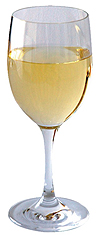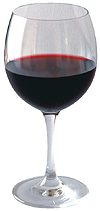 There are few things more French than wine. And the Italians arguably have a longer running relationship with wine than any other modern culture. When the evidence came to light that wine, especially red wine, has so many benefits for long-term physical health that some researchers have asserted it is more detrimental to your health to not drink it, the Europeans shrugged and the Americans gasped. The French and the Italians view wine as the water of life. It is deeply entrenched in the cultural psyches of both areas as a vehicle by which you achieve health and live a good, meaningful existence. To not drink a glass or two of wine every day at every meal excluding breakfast is to be three-quarters of the way to dead. There are few things more French than wine. And the Italians arguably have a longer running relationship with wine than any other modern culture. When the evidence came to light that wine, especially red wine, has so many benefits for long-term physical health that some researchers have asserted it is more detrimental to your health to not drink it, the Europeans shrugged and the Americans gasped. The French and the Italians view wine as the water of life. It is deeply entrenched in the cultural psyches of both areas as a vehicle by which you achieve health and live a good, meaningful existence. To not drink a glass or two of wine every day at every meal excluding breakfast is to be three-quarters of the way to dead.
The Americans were flabbergasted at the news because it exposed what Danish researchers dubbed the French Paradox. A scientific team in Denmark was the first to uncover the remarkable phenomenon that, on average, the French consume about 30 per cent more fat than Americans in the form of cheeses, butter and meat. However, the French have far lower cholesterol levels than Americans and a startlingly 40 per cent fewer heart attacks. The researchers found the moderate and daily consumption of red wine was the missing link in the American diet.
The health benefits and adversities of alcohol consumption are being intensively studied. There is ample evidence that, for most individuals, moderate consumption of alcohol in any form is harmless, and likely to be beneficial, and it is beyond debate that abuse of alcohol is harmful and dangerous.
The great weight of evidence for health benefits of moderate drinking pertains to our greatest killer, coronary heart disease and to related disorders of other blood vessels. Alcohol itself is thought to contribute to at least half of these benefits, probably via several mechanisms: the improvement of blood fat patterns; the reduction of blood clotting; the possible inhibition of oxidation; and the relaxation of blood vessels. Alcohol in moderation may help against cancer and other diseases, but data is sparse and immature.
Of intense interest is whether wine possesses special attributes in addition to those of alcohol, substances that may add to or enhance the benefits of alcohol. In particular, attention is focused upon a series of vegetal compounds, the polyphenolic flavonoids, found in wine and some foods. These compounds are natural components of grapes and other plants. Some, for example, function as anti-fungal agents in vines. It may be that the value of the Mediterranean diet derives in part from these compounds. Because the flavonoids are contained in highest concentration in grape skins, wine - especially red wine - is more likely to provide benefits than beer. Spirits are least endowed.
A number of the beneficial effects of the flavonoids found in wine may be shared with alcohol and with antioxidant vitamins. The flavonoids may favorably alter blood lipids and enhance blood-vessel function, and may inhibit oxidation. (Oxidation leads to the most dangerous form of cholesterol, and may be operative in the genesis of cancer and other forms of tissue damage.) Potentially damaging blood clotting within the blood vessels of the heart, brain and legs are retarded via a complex of pathways. Flavonoids, which are a diverse group of compounds (quercetin and resveratrol are two of the best known), may reduce the risk of infections6 and cancer, and may enhance cancer treatment.
Damage to DNA by oxidative generation of highly reactive free radicals is thought to be of major importance in malignant transformation of cells.
Resveratrol, a compound that can be absorbed from wine, may thwart cancer through a number of means. Quercetin, found in allium vegetables (onions, leeks and garlic), broccoli and red wine, has been associated with reduced risk of stomach cancer, inhibited growth in leukemia, ovarian and uterine cancer cells, and enhanced potency of anti-cancer drugs.
|
|
Red wine ingestion has been shown experimentally to increase the antioxidant power of human blood serum. The antioxidant activity of grapes and red wine has been confirmed in the laboratory. An interesting study demonstrated delayed onset of tumors in mice that were fed red-wine solids. The major polyphenol of red wine, catechin, was shown to have been absorbed by the test animals. Despite many centuries of experience with plant-derived remedies, we are only just beginning to understand the potential value of the myriad compounds that could have vast health benefits.
This is all of course assuming that wine is consumed in moderation, just as the Europeans do, defined as roughly a glass or two of wine every day. Any alcohol consumed in excess can lead to serious health problems including heightened risks for severe liver, kidney and psychological disorders.
The implication for women is particularly important, as a Harvard University study has found that a glass of red wine a day can reduce heart attacks for females by 25 per cent. In addition, wine has been found to lessen and in some cases bring a cessation to the degenerative effects of osteoporosis.
And the benefits do not stop there. No pun intended: wine seems to go to the very heart of what ails us. It aids in digestion, stimulates the appetite and combats neurodegenerative diseases such as Parkinson's and Alzheimer's. It has even been found to help combat both Anorexia and Obesity.
The benefits to the heart, bones and immune system not
withstanding , wine helps address the big kahuna of problems in most people's lives: stress. While it's true that alcohol in of itself reduces emotional stress when consumed in moderation, wine adds an additional quality that is reflected in how it is enjoyed. In Europe, wine is always consumed at meals (among other times). Sitting down for a lunch and dinner is a time to relax and enjoy your food and surroundings. A glass or two of wine helps promote this sense of taking a time-out to enjoy your life. There is no better time in a hectic day of work than at meals to give your mind, body and soul a respite from all of the demands of a modern lifestyle. , wine helps address the big kahuna of problems in most people's lives: stress. While it's true that alcohol in of itself reduces emotional stress when consumed in moderation, wine adds an additional quality that is reflected in how it is enjoyed. In Europe, wine is always consumed at meals (among other times). Sitting down for a lunch and dinner is a time to relax and enjoy your food and surroundings. A glass or two of wine helps promote this sense of taking a time-out to enjoy your life. There is no better time in a hectic day of work than at meals to give your mind, body and soul a respite from all of the demands of a modern lifestyle.
Wine is a way to take a step back, to remember why you're living in the first place, a way to savour your life, if you will. In this way, making it a part of your daily eating rituals can do as much or more for your health as a counsellor, herbal remedy or television
programme. |